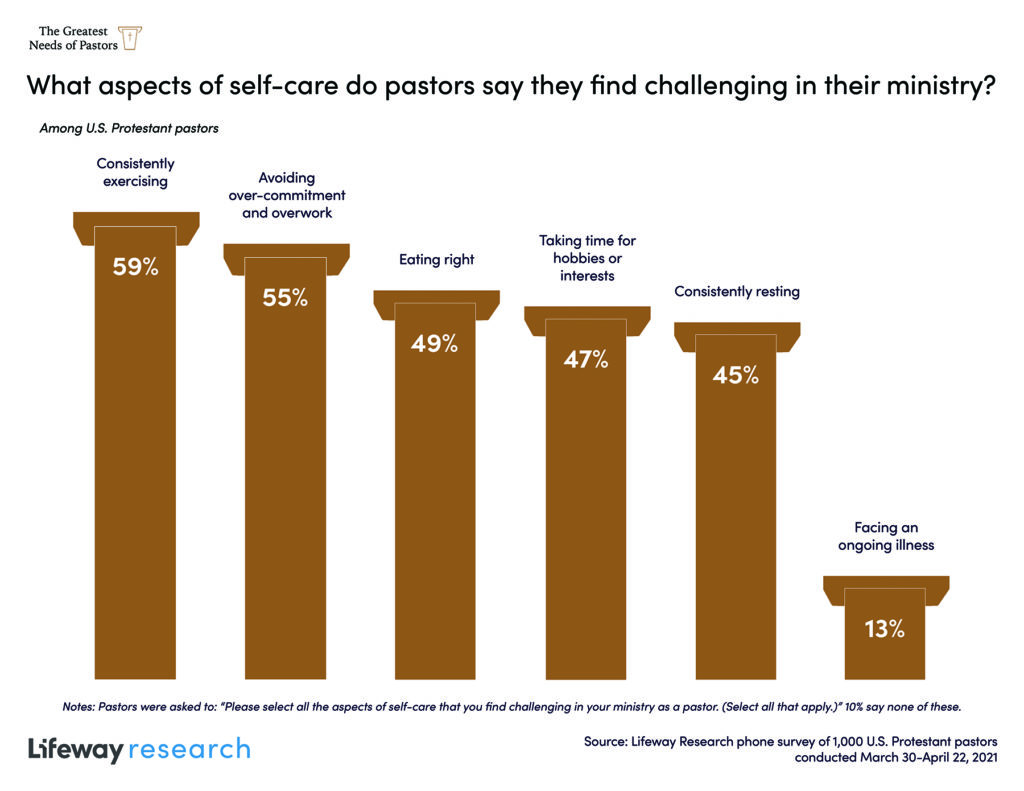When asked to narrow down the single greatest need in their personal lives, 30% of U.S. Protestant pastors say time management and 21% say balance between work and home.
Fewer than 1 in 10 point to children (9%), caring for aging parents (9%), marriage (8%) or financial stress (6%). Another 18% either say none of these or they aren’t sure.
Pastors of churches with fewer than 50 in attendance are the most likely to say they most need to give attention to time management (39%) and least likely to say balance between work and home (14%).
When pastors are asked to narrow down all their needs to their single greatest need, 20 needs are chosen by more than 1% of pastors, including time management (3%) and balance between work and home (2%).
Pastoral Self-Care
Pastors, who make a career of caring for the needs of others, admit they often need to give attention to caring for themselves. Nine in 10 U.S. Protestant pastors point to at least one area in the self-care category as a need for them, and 14% say the category of self-care is the most challenging personally.
More than half of pastors say they find consistently exercising (59%) and avoiding over-commitment and overwork (55%) to be challenging in their ministry. Slightly less than half say they struggle with eating right (49%), taking time away from their job for hobbies or other interests (47%) and consistently resting (45%). Far fewer say they face an ongoing illness (13%), while 10% say none of these is an area of difficulty.
“While most pastors are quick to say they have several challenges in caring for themselves, they are also quick to prioritize ministry needs ahead of their own,” said McConnell. “Among categories that need attention today, almost two-thirds of pastors put skills, people or ministry difficulties ahead of their own self-care. Constantly working from a physical deficit is not a sustainable formula for pastoral ministry.”

Pastors of churches with worship service attendance between 100-249 (57%) and those with 250 or more (60%) are more likely than pastors of churches with fewer than 50 in attendance (48%) to say they find avoiding over-commitment and overwork to be a challenge for them.
Those 55 and older (17%) are more likely than younger pastors to say they are facing an ongoing illness.
African American pastors (63%) are more likely than white pastors (42%) to say consistently resting is a self-care area of need from them. The same is true for pastors 44 and younger (50%) compared to pastors 65 and older (37%).
When asked what self-care need is the most challenging for them, a quarter of U.S. Protestant pastors point to avoiding over-commitment and overwork (24%) and consistently exercising (24%). Fewer mention eating right (14%), taking time for hobbies (13%), consistently resting (9%) or facing an ongoing illness (5%). Around 1 in 10 pastors (11%) say they aren’t sure or none of these issues are the most challenging for them.
Younger pastors and those at larger churches are among the most likely to identify avoiding over-commitment and overwork as the top self-care need they face. Those 44 and younger (30%) are more likely than those 65 and older (17%) to single out overworking. Similarly, those pastoring churches with attendance of 250 or more (35%) and 100-249 (28%) are more likely than those with congregations of 50-99 (19%) or those with fewer than 50 (20%) to say avoiding over-commitment is their greatest self-care need.

